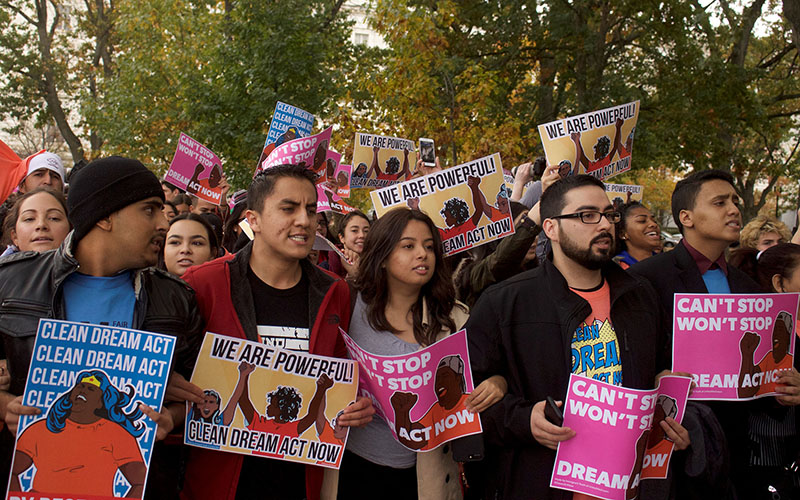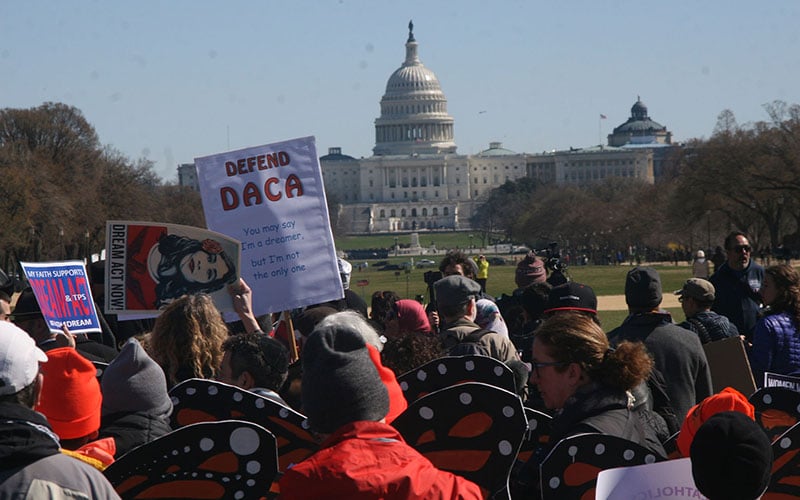WASHINGTON – Lawyers in Arizona and southern Nevada said they have started receiving notices that Immigration and Customs Enforcement wants to set new court dates for their clients who are currently protected from deportation by DACA.
The notices started coming just weeks before the Supreme Court’s Nov. 12 arguments on several challenges to the Trump administration’s effort to do away with the Deferred Action for Childhood Arrivals program – and months before any ruling is likely to come down from the justices.
The lawyers, who represent clients in Phoenix, Tucson and Las Vegas, call the filings a “cruel” attempt by the administration to gut the program ahead of the court’s decision. All the clients, they said, had previously had their cases administratively closed by the government.
“The administration, as much as they have claimed they care about potential DREAM Act recipients, their actions speak differently,” said Mo Goldman, an immigration lawyer based in Tucson. “In the same way we’ve seen them try to get rid of DACA, they’re now putting ones who have legally obtained DACA back in front of the court.”
ICE officials did not respond to a request for comment on the notices to “recalendar” DACA recipients’ cases before an immigration court.
DACA began in 2012 under President Barack Obama. It allowed immigrants who were brought to this country illegally as children to apply for protection from deportation – if they had clean records, among other requirements – and also allowed them to hold work permits and apply for drivers’ licenses.
Critics have long called the program a presidential overreach, and then-Attorney General Jeff Sessions announced in September 2017 that the program would be phased out over six months. But that decision was soon blocked by courts, and there were still 660,880 people protected by DACA as of June 30, according to U.S. Citizenship and Immigration Services.
In order to get DACA protection, some immigrants with non-criminal charges – such as traffic violations – had their cases administratively closed by the government. By reopening those cases now, the attorneys said, their clients’ eligibility for DACA is up in the air and any application to renew the coverage could be rejected.
“We came to an agreement with ICE to administratively close the cases,” said Goldman, referring to two clients who had faced traffic citations. “Now, they’re just doing it blanketly to anyone who was in removal proceedings when the government came up with the policy to close all the cases.”
He said the motions are especially upsetting because one goal of DACA was easing the fear of deportation for recipients, a reassurance he said is now gone.
Peter Ashman, an attorney based in Las Vegas, said that ICE is resorting to reopening his clients cases because they do not have reason to revoke their DACA protection on any other grounds.
“Why wouldn’t you try, first of all, to take away (my client’s) DACA? Because you can’t, because he didn’t do anything wrong,” Ashman said.
Ashman and Goldman said any removal order handed down now could not be enforced against a DACA recipient. But it could kick in if the Supreme Court strikes down DACA in the coming months.
“Let’s say the Supreme Court comes out and says, ‘Well, we think Obama overstepped,'” Ashman said. “Is (DACA) void as of that moment, or is it void and people can extend it as long as it’s in effect until their cards expire, and then they’re fresh meat and they can be deported? We’re going to have to wait and see on that.”
Jorge Loweree, policy director for the American Immigration Council, said ICE’s latest move is “emblematic of this administration’s dragnet approach to immigration enforcement.”
“Our immigration agencies are now going after people who have been here for many years, even those who have passed the rigorous government background checks required to obtain DACA,” Loweree said. “They’re doing whatever they can to make day-to-day life more difficult for DACA beneficiaries across the country, and in doing so wasting significant enforcement resources.”
Resources that Ashman said could be better used to reduce the backlog of immigration court cases, which stood at more than 1 million cases this fall.
“Why are you whining about being overburdened with all these cases you have to deal with, and at the same time this flood at the southern border, and all the drama … but you’re wasting resources trying to deport someone in proceedings who you’re not going to be able to remove from the country?” he asked.
Both attorneys said they are considering appealing the recalendaring, but it’s a case-by-case decision.
“I think we have a really good shot at getting them to kind of say, ‘This absolutely makes no sense,'” Ashman said of a potential appeal. “On one hand, the government of the United States is promising this young man that if he does A, B, C and D, then we won’t move to deport him. On the other hand, they’re moving to deport him. So when is a promise not a promise? When is a contract not a contract?”
Goldman said there may not be a particular reason why ICE filed motions against the individuals they did – and that “a lot of times … it’s just bad luck.”
“Much of the immigration system is … a lot of it is based on luck,” Goldman said. “When it comes to the removal part of it – you could be just living your life one day, been here for 15 or 20 years, and next thing you know, you get pulled over because a taillight is out and that leads you to be placed in deportation proceedings.”



